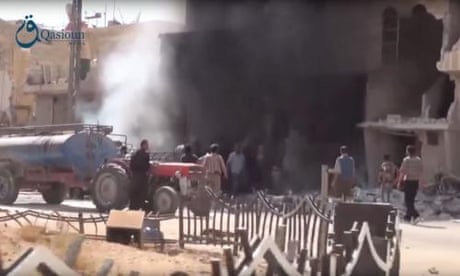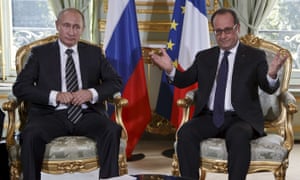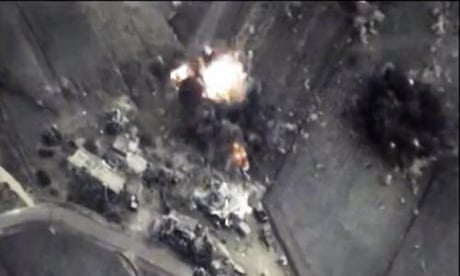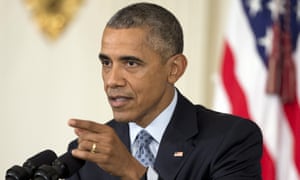Barack Obama speaks to reporters in the White House: ‘[Putin] doesn’t distinguish between Isil and a moderate Sunni opposition that wants to see Mr Assad go.’ Photograph: Manuel Balce Ceneta/AP
Shaun Walker in Moscow Lauren Gambino in New York Ian Black in London and Kareem Shaheen in Beirut
Russia’s failure to distinguish between Islamic State fighters and moderate opposition forces battling against Syria’s president, Bashar al-Assad, is a “recipe for disaster,” Barack Obama has said, as more evidence emerged that Moscow is targeting anti-regime rebels and not just Isis.
The US president said his Russian counterpart, Vladimir Putin, “doesn’t distinguish between Isil [Isis] and a moderate Sunni opposition that wants to see Mr Assad go. From their perspective, they’re all terrorists. And that’s a recipe for disaster.”
A statement released earlier on Friday by the US-led coalition fighting Isis expressed deep concern about attacks by the Russian air force on Hama, Homs and Idlib. The attacks did not hit the jihadi group but caused civilian casualties.
“These military actions constitute a further escalation and will only fuel more extremism and radicalisation,” said the statement by France, Germany, Qatar, Saudi Arabia, Turkey, the US and Britain. “We call on the Russian federation to immediately cease its attacks on the Syrian opposition and civilians and to focus its efforts on fighting Isil.”
Speaking at the White House, Obama said that only Assad and Iran supported Russia’s intervention in the conflict, but he pledged that he would not turn the Syrian civil war into a “proxy war” between the US and Russia. “This is not some superpower chessboard contest,” he said.
Moscow’s strategy, he said, was a self-defeating exercise which would strengthen Isis, drive the moderate opposition underground and further complicate any hopes of a political settlement.
“A military solution alone – an attempt by Russia and Iran to prop up Assad and try to pacify the population – is just going to get them stuck in a quagmire and it won’t work,” he said.

'People are angry and boiling': Syrians tell of Russian airstrikes
After a meeting with Putin in Paris, the French president, François Hollande said: “Russia’s position hasn’t changed, it has always been about support for Assad and his regime.”
Emphasising to the Russian president that a political solution was needed, the French leader told Putin that Russian airstrikes “should be against Isis and only Isis”.
Shaun Walker in Moscow Lauren Gambino in New York Ian Black in London and Kareem Shaheen in Beirut
Russia’s failure to distinguish between Islamic State fighters and moderate opposition forces battling against Syria’s president, Bashar al-Assad, is a “recipe for disaster,” Barack Obama has said, as more evidence emerged that Moscow is targeting anti-regime rebels and not just Isis.
The US president said his Russian counterpart, Vladimir Putin, “doesn’t distinguish between Isil [Isis] and a moderate Sunni opposition that wants to see Mr Assad go. From their perspective, they’re all terrorists. And that’s a recipe for disaster.”
A statement released earlier on Friday by the US-led coalition fighting Isis expressed deep concern about attacks by the Russian air force on Hama, Homs and Idlib. The attacks did not hit the jihadi group but caused civilian casualties.
“These military actions constitute a further escalation and will only fuel more extremism and radicalisation,” said the statement by France, Germany, Qatar, Saudi Arabia, Turkey, the US and Britain. “We call on the Russian federation to immediately cease its attacks on the Syrian opposition and civilians and to focus its efforts on fighting Isil.”
Speaking at the White House, Obama said that only Assad and Iran supported Russia’s intervention in the conflict, but he pledged that he would not turn the Syrian civil war into a “proxy war” between the US and Russia. “This is not some superpower chessboard contest,” he said.
Moscow’s strategy, he said, was a self-defeating exercise which would strengthen Isis, drive the moderate opposition underground and further complicate any hopes of a political settlement.
“A military solution alone – an attempt by Russia and Iran to prop up Assad and try to pacify the population – is just going to get them stuck in a quagmire and it won’t work,” he said.

'People are angry and boiling': Syrians tell of Russian airstrikes
After a meeting with Putin in Paris, the French president, François Hollande said: “Russia’s position hasn’t changed, it has always been about support for Assad and his regime.”
Emphasising to the Russian president that a political solution was needed, the French leader told Putin that Russian airstrikes “should be against Isis and only Isis”.

Facebook Twitter Pinterest Vladimir Putin and François Hollande meet at the Élysée Palace in Paris. Photograph: Reuters
During the meeting, the German chancellor, Angela Merkel, said: “We shouldn’t forget what has happened in Syria over the past year: hundreds of thousands of people lost their lives before the Islamic State appeared and this was a result of what Assad did with his people.”
The US-led coalition announced that its planes had targeted Isis in 28 airstrikes on Thursday in Iraq and Syria. The UN said it had been unable to deliver humanitarian aid in support of a ceasefire agreement “due to the recent surge of military activity” – which diplomats said was a reference to the Russian bombing.
Amid heightened tensions on the third day of the Russian campaign, an unnamed senior official in Tehran denied a report that Iran was sending hundreds of troops to fight with the Syrian army – a move that would constitute a dramatic departure from Iran’s normally low-profile support for Assad.
It seemed likely the claim, attributed to sources in Iran’s Lebanese ally, Hezbollah, was intended to reinforce the impression of a powerful alliance backing Assad in the face of western and Arab demands he step down. Analysts have said they expect Syrian government forces to launch a new offensive in the wake of the Russian air campaign.
Syrian state media has been highlighting the “destructive capabilities” of new aircraft.
Moscow’s strategy appears to be to mainly attack central and north-western Syria, areas that form the gateway to Damascus and the coast. But Russian planes also bombed targets west of Raqqa, the capital of Isis’s self-proclaimed caliphate – apparently the first time likely Isis positions have been hit.
Alexei Pushkov, a top Russian foreign affairs official, told French radio he believed the air campaign could last about three to four months. He also hit out at western criticism, tweeting: “The US is criticising Russia for ‘lack of selectivity in our targets’ in Syria. So what stopped them from picking the right targets over a whole year, rather than just pointlessly bombing the desert?!”

Russia admits targeting non-Isis groups in Syria as airstrikes continue
Russian officials have denied claims that some of their airstrikes missed their targets and dismissed suggestions from the west that planes were mainly bombing rebel groups opposed to the Assad regime, rather than Isis. “The main target are the Daesh [Isis] groups situated closest to Damascus,” Pushkov insisted.
In fact, Russian targets include fighters who have received limited backing from the US as well as more hardline Islamist groups. The Russian defence ministry said its aircraft carried out 18 sorties in Syria in the past 24 hours, including 10 overnight.
The airstrikes primarily hit non-Isis rebel positions, including in Darat al-Izza – a town in western Aleppo held by rebel fighters including the al-Qaida affiliate in Syria, Jabhat al-Nusra – and Maarat al-Nu’man, a town in Idlib province held by Jaysh al-Fateh, a coalition of rebel fighters that also includes Nusra.
Syrian state TV said Russian aircraft also struck rebel positions in Hama province, where opposition fighters are battling to wrest control of the strategic al-Ghab plain from forces loyal to Assad’s regime, in an effort to advance towards his coastal stronghold of Latakia. Attacks also took place in Idlib, where residents told of widespread destruction.
Russia’s foreign ministry and Putin have spoken of an “informational campaign” against Moscow by the west, reminiscent of the language they used when repeatedly denying the presence of Russian troops in eastern Ukraine over the past year and a half despite evidence to the contrary.
Analysis Who's who in the Syrian conflict, and what happens next?
Russian targets so far include secular fighters who have received limited backing from the US, and more hardline Islamist groups
Walid al-Muallem, the Syrian foreign minister, attacked Israel, the west, Gulf states and Turkey for backing terrorists. Addressing the UN general assembly on Friday, Muallem said Damascus was committed to a “national dialogue” to resolve political differences. But only Syrians could decide the president’s future, he said.
Saudi Arabia and its Gulf allies have continued to insist that Assad must go, but a senior Arab diplomat denied reports that Qatar had stepped up arms deliveries to Syrian rebels in response to the Russian attacks. The US, Britain and others have signalled that Assad could remain during a political transition to end the four-and-a-half-year-old war. The hope in western capitals is that Moscow will use its influence to ensure a transition does indeed take place.
An aide to the French president said Hollande and Putin had an in-depth discussion in which they “tried to narrow down differences on political transition”. But both leaders looked stern as they exchanged handshakes in a yard of the Élysée palace. The talks focused on the goals of the Russian intervention, the safety of civilians and a future transition, Palace sources told Le Monde.
The two also held talks with Merkel and the Ukrainian president, Petro Poroshenko, that were meant to focus on resolving the situation in eastern Ukraine. There has been speculation that Putin might attempt to link the two issues, offering cooperation in Syria for de-escalation in Ukraine and a lifting of western sanctions imposed over Russia’s actions there.
There has been edgy diplomacy ahead of the meeting, with Ukraine’s presidential administration claiming Putin had asked for a separate bilateral meeting with Poroshenko on the sidelines of the meeting, which Kiev was considering.





No comments:
Post a Comment